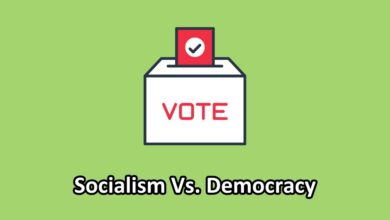In a world where political ideologies shape the destiny of nations, Authoritarianism and Libertarianism stand at two opposite ends of the spectrum. Picture a society where individual freedoms clash with centralized control, a tale of power and liberty unfolds.
Authoritarianism leans towards centralized authority, often characterized by a strong leader or government, while Libertarianism champions individual liberty, advocating for minimal government intervention. As we delve deeper, the intricacies of these ideologies will emerge, guiding us through the labyrinth of political thought.
Authoritarian Vs. Libertarian (Comparison Chart)
| Factors | Authoritarian | Libertarian |
|---|---|---|
| What are They? | Authoritarianism is a political system characterized by a powerful, centralized government that exerts significant control over various aspects of society. | Libertarianism refers to a political philosophy advocating for limited government intervention, prioritizing individual liberties as fundamental. |
| Role of Government | Authoritarianism embraces a powerful state with extensive control, where authority is centralized and decisions are made top-down. | Libertarianism advocates for a limited government focused on protecting individual rights. |
| Individual Freedom | It sacrifices individual freedoms for collective order, emphasizing social cohesion and order over individual autonomy. | Libertarianism prioritizes individual liberties as the cornerstone of a just society. |
| Economic Philosophy | Authoritarian regimes may employ command economies, central planning, and state ownership of resources. | Libertarians advocate for free-market capitalism, promoting individual initiative and economic efficiency. |
| Political Pluralism | Authoritarianism stifles political diversity, limits opposing views, and may suppress dissenting voices. | Libertarianism encourages a variety of political ideologies within a framework of minimal government intervention. |
What is Authoritarian?
Authoritarianism, at its core, is a political system marked by strong central authority and limited individual freedoms. In essence, it vests power in a singular entity, whether a leader or a governing body, with limited input from the general populace. This form of governance often thrives on control, order, and conformity.
Key Characteristics of Authoritarian Systems
- Centralized Power: Authoritarian regimes concentrate power in a central authority, be it a single leader or a ruling elite. Decisions and policies flow from the top down.
- Limited Political Pluralism: Authoritarianism suppresses political diversity, limiting opposition parties and alternative voices that might challenge the ruling authority.
- Restricted Civil Liberties: In an authoritarian setup, individual freedoms are constrained in the name of maintaining order and stability. Strict control over media and communication often accompanies this limitation.
- Command Economy: Authoritarian regimes often control economic activities, directing resources according to the state’s priorities rather than market forces.
What is Libertarianism
In contrast to Authoritarianism, Libertarianism champions individual liberty as its core principle. This ideology advocates for minimal government intervention, emphasizing personal freedom and free-market capitalism.
Libertarianism is a political philosophy that prioritizes individual rights, limited government, and free-market capitalism. It envisions a society where personal freedom is paramount, and governmental interference is minimized.
Key Tenets of Libertarian Ideologies
- Individual Liberty: Libertarians believe in the absolute sovereignty of the individual, asserting that personal freedoms should be protected and preserved at all costs.
- Limited Government: Central to Libertarian thought is the idea of a small, limited government. It should serve only to protect individual rights and maintain public order, avoiding unnecessary intrusion.
- Free-Market Capitalism: Libertarians advocate for a laissez-faire economic system where market forces operate without substantial government regulation. They argue that this fosters innovation and economic growth.
- Non-Aggression Principle: Central to Libertarian ethics is the non-aggression principle, asserting that the initiation of force or coercion is inherently wrong, and interactions should be voluntary.
Key Differences Between Authoritarian and Libertarian
- Role of Government: The fundamental distinction lies in the role of government; Authoritarianism embraces a powerful state, while Libertarianism seeks a limited government focused on protecting individual rights.
- Individual Freedom: Authoritarianism sacrifices individual freedoms for collective order, whereas Libertarianism prioritizes individual liberties as the cornerstone of a just society.
- Economic Philosophy: Authoritarian regimes may employ command economies, while Libertarians advocate for free-market capitalism, believing it promotes individual initiative and economic efficiency.
- Political Pluralism: Authoritarian systems stifle political diversity, while Libertarianism encourages a variety of political ideologies within a framework of minimal government intervention.
Individual Rights and Freedoms
In Authoritarianism, individual rights often take a back seat to collective stability. The emphasis is on maintaining order, even if it means curtailing personal freedoms. Authoritarian regimes may restrict freedom of expression, assembly, and association to prevent dissent, considering these limitations necessary for societal cohesion.
On the flip side, Libertarianism places individual rights at the forefront. Here, personal freedom is sacrosanct, and any infringement by the government is viewed skeptically. Libertarians argue that limiting individual rights undermines the essence of a free society.
Role of Personal Liberties, Free Speech, and Privacy in Both Ideologies
In Authoritarianism, personal liberties, free speech, and privacy often face stringent controls. Free speech may be suppressed to maintain a unified narrative, and privacy may be compromised in the name of state security.
Contrarily, Libertarianism champions unrestricted personal liberties, viewing free speech as a fundamental right that should be protected at all costs. Privacy is considered inviolable, and any attempt by the government to encroach upon it is vehemently opposed.
The clash between these ideologies lies in the balance between societal order and the preservation of individual rights.
Conclusion
In the grand tapestry of political ideologies, Authoritarianism and Libertarianism represent contrasting threads. As we conclude this exploration, ponder the delicate equilibrium between centralized control and individual freedom. The world watches, waiting to see which ideology will shape the chapters of its future.



